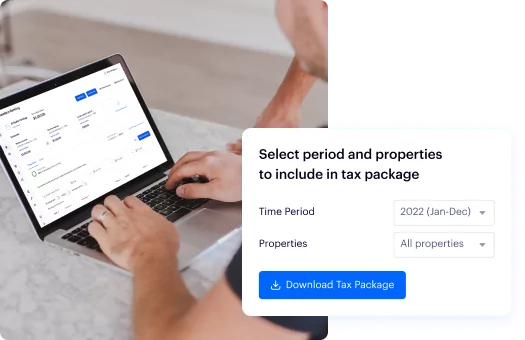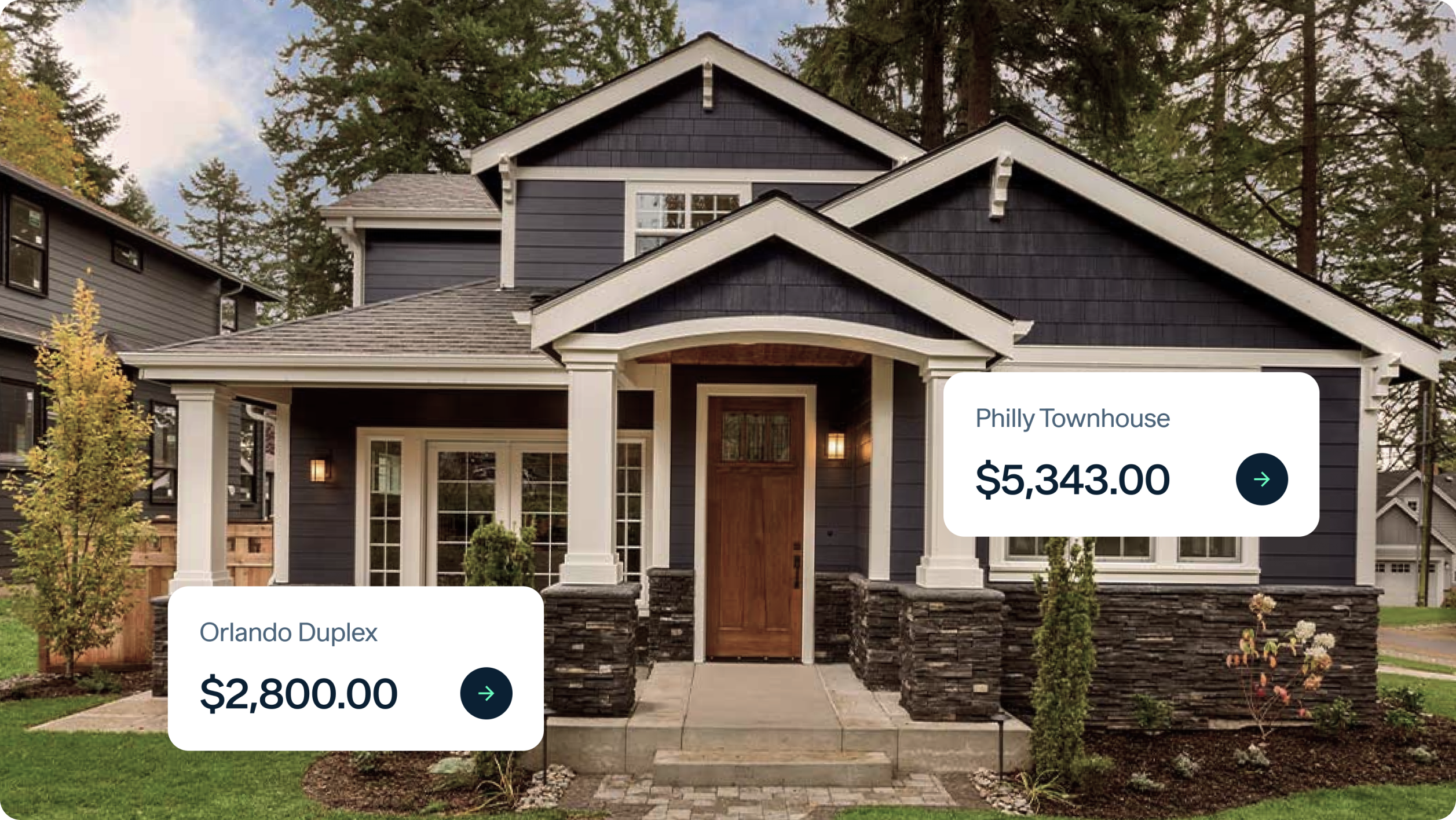Running a short-term rental requires a lot of effort to bring in around $36,678 a year, so it’s only fair to pay yourself for all the hard work you put into self-managing a rental property. Charging yourself a management fee for short-term rentals can save you from spending 15-40% of your rental income on STR property management fees and offer a tax deduction on Airbnb expenses.
In this guide, we’ll explore the ins and outs of charging yourself STR property management fees, including how to structure the process, steps for calculating fees, tax reporting tips, and real-world examples. Let’s dive in!
Key takeaways
- Charging yourself a property management fee helps reflect the true cost of managing your rental and creates a tax-deductible business expense.
- Structuring separate entities for property ownership and management allows you to pay yourself legally and maintain clear financial separation.
- Deducting management fees and operating costs can reduce your taxable rental income, saving you money at tax time.
- Setting a fair, market-based fee backed by a formal agreement strengthens IRS compliance and helps legitimize your self-management strategy.
- Using accounting tools like Baselane simplifies income tracking, expense categorization, and managing multiple entities under one login.
What does charging yourself a management fee for short-term rental mean?
Charging yourself a management fee for a short-term rental means that you, as the vacation rental owner, create a formal structure to compensate yourself (or a business entity you own) for the time, effort, and services provided in managing your rental property. This practice is often used to establish clear accounting, separate responsibilities, and claim tax advantages.
Why charge yourself a management fee?
Charging yourself a management fee for short-term rentals gives you tax relief and improves the accounting process. Here’s how:
Reflects fair market value
When you self-manage a rental property, it’s easy to underestimate the true value of the time and effort you contribute. Paying yourself a management fee helps accurately reflect the real cost of managing your property. This is particularly insightful when comparing the profitability of self-management compared to hiring a property manager.
Separates legal entities
To legally pay yourself property management fees and ensure they are deductible business expenses, you must operate your rental property and your management activities through two separate legal entities:
- Entity 1: Owns the property (e.g., “Sunset Properties LLC”)
- Entity 2: Provides management services (e.g., “Sunset Property Management, Inc.”)
By separating these entities, you create a formal business-to-business relationship, which allows your rental entity to pay your management company a fee that’s legitimately deductible as an operating expense. The management income is then reported by the second entity, which can be structured as either an LLC or S Corporation.
How the structures work:
- LLC as a property owner: Keeps rental income, expenses, and liability separate from personal finances. It can deduct the management fee paid to the other entity.
- LLC or S Corp as a property manager: Provides services like guest communication, booking, maintenance coordination, and reporting. As an S Corp, you can pay yourself a reasonable salary and take distributions to reduce self-employment taxes.
This setup provides key benefits, including a clear financial paper trail, IRS compliance, and additional liability protection.
Reduces taxable income
Deducting the costs of running and self-managing a rental property will help lower your tax bill. This includes direct costs (for operating a rental) and indirect costs (for owning a property).
- Direct costs: Cleaning fees, repairs, maintenance, supplies, utilities, guest amenities, and marketing expenses.
- Indirect costs: Property management fees, mortgage interest, depreciation, property taxes, HOA fees, legal or accounting services, and insurance for Airbnb property.
The portion of property expenses you can deduct depends on how much of the property is used solely for rental purposes and how long it’s occupied. Direct expenses are 100% deductible.
For example, if you make $30,000 in rental income and you charge yourself a $3,000 management fee, this would reduce your taxable income to $27,000.
If you rent out your entire property exclusively for 150 days in a year, you can deduct expenses for those 150 days. If the property is used personally for part of the year, you must prorate the expenses based on the rental period.
For example, if you rent out a 150-square-foot room in a 1,200-square-foot house for 65 days, you can deduct a portion of your expenses for the rented space and time. This means you can deduct 18% (65 days rented ÷ 365 total days) of 12.5% (150 sq ft ÷ 1,200 sq ft) of your total expenses. If your total expenses are $10,000, the deductible amount would be $225 (18% × 12.5% × $10,000).
Check out our full guide to Airbnb accounting and bookkeeping.
How to charge yourself a management fee?
Step 1: Establish the framework
Create a separate management entity
The first thing you need to do is create a separate LLC management entity with its own employer identification number (EIN). Once this is set up, register it with the local authorities and get any necessary business licenses.
You will need a separate bank account for the rental property management business. This will keep finances separate from your rental business and make it easier to track income and expenses for short-term rental management. Here’s a list of the best business bank accounts for Airbnb.
Set a fair management fee
Research local property management rates to set a fair fee for your services. While you may not match their rates exactly, your fee should be in a reasonable range. Here are a few things to consider:
- Average fees: Professional property management fees generally range from 15-25% of the rental income generated but can be as high as 40%.
- Property type & location: Average Airbnb property management fees for entire homes or apartments range from 20-30%. High-demand markets (e.g., popular tourist destinations) typically have fees between 20-40% compared to 15-25% for low-demand areas.
- Service level: Pricing for partial service is usually lower (10-20%) than full-service management (20-30%) since it includes additional services for listing management, property maintenance, guest communications, financial reporting, and legal compliance.
For example, a single-family property on the beach in Miami, FL (one of the most profitable Airbnb locations in Florida) makes around $24,000 a year. The average property management fees in Miami are 20-30% of the monthly rental income. Based on this, you can reasonably charge yourself a property fee that’s around 25% of your rental income.
Draft a management agreement
Create a formal contract between yourself (the property owner) and your management entity (the vacation rental management company). This agreement should outline all of the details related to your vacation rental management fees, including:
- Services you’ll provide: Airbnb property management services generally include guest communications, property maintenance, marketing, cleaning, pricing adjustments, and legal compliance.
- Your management fee structure: Common structures include percentage-based fees (10-30% of rental income) and flat-rate fees ($100-$500 per month).
- The payment schedule: Fees can be collected monthly, per booking, or on a quarterly/annual basis.
Step 2: Calculate the management fee
Decide whether the fee will be a percentage of rental income or a flat monthly fee:
- Percentage-based fees: Charge a fixed percentage of the monthly rental income. For example, if your property generates $5,000 per month and your fee is 15%, you’d pay your management company $750.
- Flat-rate fees: Charge a set amount each month, regardless of rental income. This can provide more predictable cash flow but may not account for seasonal fluctuations in revenue. To determine your flat rate, consider factors such as your average rental income, operating expenses, and the level of services provided to ensure it remains sustainable.
Step 3: Pay the management fee
Each month, follow these steps for charging yourself a management fee for short-term rentals:
Invoice the property:
- The management entity issues an invoice to the property for services rendered.
- This invoice is recorded as an expense for the property.
Transfer the funds:
- Transfer the fee amount from the property’s bank account to the management entity’s account.
- This step formalizes the transaction for accounting purposes.
Document the payment:
- Keep a record of the payment in both the property’s and the management entity’s financial records.
Step 4: Report income and expenses
When it’s time to file taxes, you’ll need to report the management fee on separate tax returns for the property and management entities.
- For the property: Deduct the management fee as an operating expense when reporting rental income on Schedule E (Form 1040) for rental properties.
- For the management entity: Report the management fee as business income on Schedule C (Form 1040) if you operate as a sole proprietor or a single-member LLC (use Form 1065 for partnership LLCs).
For example, let’s say you own a short-term rental property that brings in $6,000 per month and has a management fee of 20%. The management entity sends an invoice for $1,200 each month, and the property owner pays the fee.
When it comes time to file taxes:
- The property owner can deduct the $1,200 as an operating expense.
- The management entity reports the $1,200 as income.
You can offset the management entity’s taxable income by deducting other fees associated with short-term rental management, such as:
Setup fees
- Listing fees: 3-8% per booking
- Marketing and photography: $200-$500
- Furniture and supplies: $5,000-$15,000 (depends on property size and furniture quality)
Cleaning and maintenance fees
- Cleaning fees: $50-$200 per booking
- Laundry services: $10-$50 per load (often included in cleaning fee)
- Maintenance and repairs: $50-$500+ for repairs and $100-$250 for seasonal maintenance ($1,000-$5,000 for annual maintenance)
Utility and operational fees
- Utility fees: $150-$200 monthly
- Connection fees: $50-$200 per service
- Security systems: $20-$50 monthly ($100-$1,500 for installation)
Guest services fees
- Late check-in or check-out: $20-$50
- Lost key replacement: $10-$50
- Damage handling fee: $500-$500 (often covered by security deposits)
Legal and compliance fees
- Licensing and permit applications: $100-$1,000 annually
- Property insurance: $2,800-$3,900 annually
- HOA fees (if applicable): $100-$500 monthly
Costs can vary based on location, property size, and specific service providers. Get quotes from local professionals for accurate budgeting.
Step 5: Optimize tax benefits
To make the most of your self-management arrangement, consider these tax strategies:
- Avoid double taxation: If your management company is taxed as a pass-through entity (like a sole proprietorship or LLC), the income will flow through to your personal tax return. This can help you avoid paying corporate taxes on top of individual taxes.
- Maximize deductions: Keep detailed records of any expenses related to managing the property, such as software subscriptions or mileage for maintenance visits.
- Consult a tax professional: Work with a knowledgeable tax accountant or a real estate CPA to structure your entities and fees in the best way for tax savings while complying with local and federal tax laws.
Automate short-term rental accounting with Baselane
Self-managing your rentals can cut down on costs, but it demands significant time and effort, especially for financial management. That’s where Baselane can help.
Baselane’s AI-powered bookkeeping and integrated banking let you open unlimited accounts per property for all your entities, add them as payout methods on vacation rental sites (Airbnb, Vrbo, booking.com, etc.), and sync your external accounts and cards in one place where all your transactions are auto-tagged by property and expense category to take the guesswork and time out of tax season. Plus, you can create virtual debit cards for property managers, co-hosts, cleaners, or other team members and use smart limits to control spending.
Ready to put your short-term rental finances on autopilot? Sign up for free today.
FAQs
It depends on your time, skills, and comfort level. Self-management might be a good fit if you enjoy hands-on management, have time for daily tasks, and want to save on property management fees.
Hiring a property manager could be better if you prefer a hands-off approach, avoid tenant issues, or lack knowledge of local laws.
Landlord software is a great alternative option, automating routine tasks so you can easily self-manage rental properties or reduce the costs of hiring a property manager for specific services. Here’s a list of the best landlord software platforms.
To self-managing vacation rentals, follow these key guidelines:
- Understand local regulations for short-term rentals and taxes.
- Calculate costs and optimize your pricing strategy.
- Advertise your short-term rental on popular listing sites like Airbnb and Vrbo.
- Automate check-in and check-out and implement smart home systems.
- Find reliable contractors and cleaning services.
- Conduct regular inspections and address maintenance issues promptly.
- Promptly respond to guest communications and quickly resolve issues.
- Use vacation rental accounting software to track income and expenses for taxes.
Read our full guide on how to manage a vacation rental property successfully.
Yes, you can charge yourself a management fee for your Airbnb property. It’s best practice to set up a separate management entity to pay yourself a management fee and deduct the expense as the property owner. It's important to document STR property management fees properly and ensure that they’re reasonable compared to what you would pay a third-party manager.
Baselane’s landlord accounting automates income and expense tracking for multiple entities under the same login, making it easy to keep all your finances straight.
Charging yourself a management fee for short-term rentals can offer several tax benefits, especially when structured properly. Here’s how it works and what to consider:
- Shifts income to a different entity: If your short-term rental property is owned by one entity (e.g., LLC or S-Corp) and managed by another (e.g., a management company you own), paying a management fee moves income from one entity to another, reducing your overall tax liability.
- Creates deductible business expense: The management fee becomes a deductible expense for the rental property (the paying entity), reducing its taxable rental income.
- Allows cost segregation and passive vs. active income benefits: If structured right, the management activity could qualify you as a real estate professional or active participant, allowing you to offset passive losses against active income (subject to IRS rules like material participation).
Research local property management rates to determine a fair market value for your management services. Typically, management fees range between 15-25% to 40% or more of rental income, depending on location, services provided, and property size. Compare your self-management costs to these rates to ensure your fee meets industry standards.
Yes, you can expense and charge yourself a management fee for a short-term rental property under certain conditions. This can be a legitimate tax strategy and accounting practice if done correctly. Here’s to do it:
Set up a legal entity and separate bank account
- Create a management agreement
- Calculate and pay the management fee
- Report income and expenses
- Optimize tax benefits
- Consult a tax professional (if needed)
Baselane banking lets you open unlimited checking and savings accounts for all your entities, while other banks only support a single entity. Instead of switching between bank accounts and spreadsheets, Baselane brings all your entities under one login and automates bookkeeping, giving you a clear view of your cash flow without all the extra admin.









